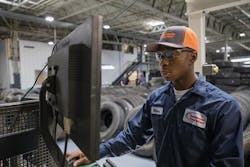The world of retreading looks a lot like the rest of the United States tire industry. Customer demand is strong, but the supply side of the equation has been problematic.
One issue is tread rubber. Its availability ebbs and flows. Some manufacturers are doing better than others to provide a steady inventory.
As one retreader puts it, his business is focusing “on maintaining customers, while our rubber supplier hurts us with terrible fill rates.”
Retreaders tell MTD that they’re hustling to meet demand in the marketplace.
At the same time, supply issues are compounding other hindrances — namely, a shortage of people. And personnel issues are compounded by the lingering threat of COVID-19.
“Retreads are in high demand,” says Dennis Beaudette, vice president of Syracuse (N.Y.) Retreaders LLC. “We are able to keep up during the slower season, but the busy season is overwhelming.”
The company is struggling “with product and people.”
At Massillon, Ohio-based Ziegler Tire & Supply Co., Vice President John Ziegler Jr. says his company has struggled to keep up.
“Demand has remained strong and we have not been able to keep up with production.”
He says this is “primarily due to a shortage of people, but (there are) some issues with rubber supply.”
Ziegler says the company’s two Michelin Retread Technologies plants had access to adequate supply through much of 2021, “but we did have some tread rubber shortages at the end of the year that for the most part have been remedied.”
At the three retread shops owned by Orange, Mass.-based Pete’s Tire Barns Inc., President Bob Berlin says tread rubber supply from Bridgestone/Bandag “has been good.” But delivery is taking longer than usual.
For Charlie Creighton, CEO of Colony Tire Corp., which is based in Edenton, S.C., securing access to tread rubber remains a top concern. The company has one truck tire retread plant that uses Michelin’s pre-mold system. “Tread rubber in many tread patterns is very hard to come by.”
Brian Chase, executive vice president for Frederick, Md.-based Donald B. Rice Tire Co. Inc., dba Rice Retreading Inc., says there “have been delays for certain treads, most noticeably long-haul treads, but our vendors have overall done a very good job of keeping us stocked.”
That’s not to say it’s all been smooth sailing at Rice Tire’s two retread facilities.
“Current demand is very strong. We have had periods of supply issues that have caused delays, but getting to fully staffed shops has been the limiting factor for production.”
And yet, Rice Tire is investing to expand its retread plants.
The company has added a buffer, changed the layout of its production equipment and made improvements to its curing chambers.
“We have invested heavily to increase production for the upcoming years to match the demand we see from our customer base,” says Chase.
In Georgia, Dorsey Tire Co. Inc.’s customers are adjusting to current market conditions and that’s resulted in fluctuating demand for retreads, says Bruce Chamblee, the dealership’s chief operating officer.
“We have seen many changes with fleets in our area. Some are converting their tires from one type to another. We have seen fleets who typically did not retread become open-minded to considering (retreads) for their operation.”
West Springfield, Mass.-based Holyoke Tire & Auto Service Inc. is among those companies wishing it could flip a switch and increase the size of its workforce.
President Pete Kearing says Holyoke Tire is “barely able to keep up” with strong demand “and could probably increase production about 15% if the employment situation was that of five years ago.”
Kearing’s company has already increased production at its retread plant in West Springfield in every category — light truck, medium truck, OTR and industrial tires. The plant has increased its use of rubber by 33% in the past couple of years.
’Surge in OTR’
The market for OTR tire retreads continues to grow, says Noah Hickman, president of Oak Hill, Ohio-based H&H Industries Inc. And that’s despite a shortage of rubber needed to retread and repair OTR tires.
“There has been a surge in the OTR retread market that has continued since 2020,” says Hickman.
“Shortages in new tires — mainly due to shipping problems — have had a positive impact on equipment users looking to fill wheel positions. Also (price) increases on new tires have made retreads more economical, even though our own costs have risen.”
In addition to sourcing rubber for its own retreads, H&H Industries sells precure rubber to other retreaders. Hickman says there’s “definitely a shortage of raw rubber,” but the company’s suppliers “have been diligent in maintaining our orders … and sending partial shipments, when necessary, and letting us order extra, when possible.”
H&H Industries, which is celebrating its 50th year in business, has never been without tread rubber, he says.
Investing in operations
Given difficulties with supply and personnel, Jesse Richards, vice president of sales for St. George, Utah-based CMC Tire Inc., says his company is investing in ways to maximize its efficiency. CMC Tire operates a ContiLifeCycle retread plant in Hurricane, Utah.
“The most significant investments we have made are in efficiency and human capital,” says Richards.
“We have increased our output by better utilizing our resources and adding people (and) shifts to ensure that the equipment we currently operate is being done so at maximum capacity.”
Dorsey Tire’s Chamblee says the bulk of the investments at his dealership have been made on the service side of its operation. But there are difficulties there, too.
“Sourcing vehicles (has) been challenging due to the inconsistent supply of new units from the vehicle manufacturers. We are also seeing a sharp increase in fuel costs in running our operation.”
Even before the March fuel price spike caused by Russia’s invasion of Ukraine, Chamblee says Dorsey Tire’s fuel costs had risen 70% compared to January 2021.
As one of the country’s largest retreaders, McCarthy Tire Service Inc. Co., which is based in Wilkes-Barre. Pa., has continued to make big-ticket investments
Some of that has been through acquisitions, which most recently included two retread plants, along with 10 service locations, that had been owned by Piedmont Truck Tires Inc. Those assets are in the Carolinas and Tennessee.
Another recent acquisition, LS Truck Tire Repair Inc., included five commercial locations in the Philadelphia, Pa., market and in New Jersey.
McCarthy Tire Service added to its OTR tire operations in 2021 with the purchase of Tire Sales LLC, also in Philadelphia.
John McCarthy Jr., the dealership’s president, says the company also has invested $1.5 million in retread equipment, plus $3.2 million in its service fleet.
One year ago Byron Center, Mich.-based Wonderland Tire Co. acquired Newport, Ky.-based Sumerel Tire Service Inc., which added three retread plants and a commercial service location at each of those plants to Wonderland’s footprint.
Wonderland Tire Chairman and CEO Jon Langerak says the acquisition “raised our retread production substantially” and also gave the company a presence in six states: Michigan, Illinois, Indiana, Ohio, Kentucky and Tennessee.
Wonderland is installing the AcuTread retread process at its Lebanon, Tenn., plant. The conversion should be complete and AcuTread should be available to customers in the Tennessee market by the late third quarter.
The company also has purchased six delivery and service vehicles and is installing new enterprise software from ASA Automotive Systems Inc., while migrating to TreadWare retreading software.
The Bridgestone ‘incident’
While supply chain problems and personnel issues aren’t a complete shock to anyone in the tire industry, at the end of February retreaders using Bridgestone Americas Inc.’s software were handed an extra complication.
An “information security incident” temporarily suspended tire production at Bridgestone’s plants. It also took down the company’s BASys Manufacturing software that dealers and retreaders use.
For Tredroc Tire Services Inc., which is based in Elk Grove, Ill., this meant a sudden loss of information for every tire on the retread production floor. (A barcode holds customer data and tread specs.)
Tredroc shut down its four Bandag retread shops for a day-and-a-half and ultimately resorted to tracking tires by paper and pen.
Zach Morris, director of manufacturing, fleet and safety for Tredroc, says the glitch cut the retreader’s efficiency.
On March 10, a Bridgestone spokesperson told MTD that the company’s plants in North America and Latin America “were back online and fully operational. “ (The company has seven tire plants in the U.S., two in Mexico and one in Canada.)
“In addition, we continue to accelerate the fulfillment of customer orders and delivery via direct shipments from our distribution centers and warehouses and customers continue to experience a steady increase in tire supply.”
About the Author
Joy Kopcha
Managing Editor
Joy Kopcha joined Modern Tire Dealer and Auto Service Professional as senior editor in 2014 after working as a newspaper reporter for a dozen years in Kansas, Indiana and Pennsylvania. She was named managing editor of MTD and ASP in 2022, and took on that same role with Motor Age in 2024.
She is an award-winning journalist, including in 2023 when she was named a Jesse H. Neal Awards Finalist.
Don't miss any of her articles. Sign up for MTD's newsletters.

